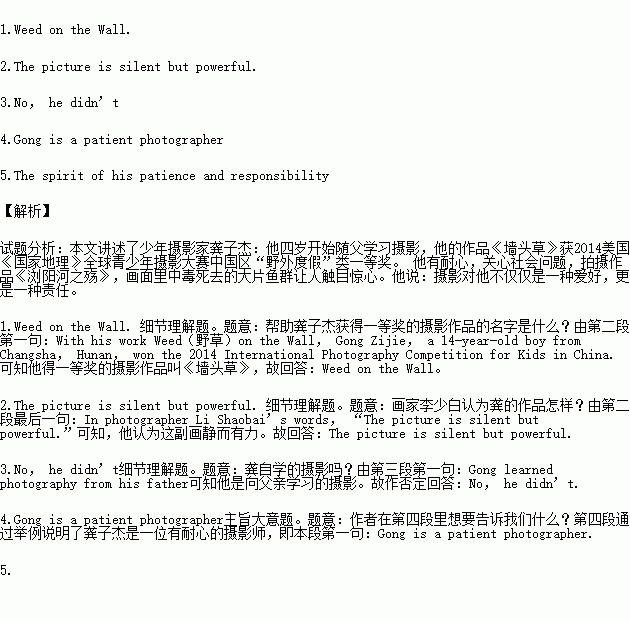题目内容

①Getting recognition(认可)from National Geographic, a famous US magazine, is the dream for many photographers. A Chinese teenage photographer has made this dream come true.
②With his work Weed(野草)on the Wall, Gong Zijie, a 14-year-old boy from Changsha, Hunan, won the 2014 International Photography Competition for Kids in China. It was hosted by National Geographic Kids. Gong got the first place for the subject Wild Vacation. His photo shows the shadow of a weed on the Forbidden City’s red walls. In photographer Li Shaobai’s words, “The picture is silent but powerful.”
③Gong learned photography from his father, a professional photographer working for Hunan TV. Since the age of 4, he has been following his father to take pictures of nature and society.
④Gong is a patient photographer. When he finds something amazing, he can spend hours waiting for the perfect time to catch the moment. In his first work, Gong took the beautiful view of the sunset near his hometown. It looked simple, but Gong worked for four days to take the best photo.
⑤Now, the young photographer cares more about social (社会的)problems. In Gong’s pictures of Liuyang River, hundreds of dead fish show us the deadly results of pollution. He has made up his mind to document polluted rivers at least once every year to make people pay more attention to environmental protection.
⑥ “Now photography is not only a hobby, but also a duty(责任)for me.” said Gong.
1.What’s the name of the photo that helped Gong Zijie get the first place?
2.What does photographer Li Shaobai think of Gong’s work?
3.Did Gong learn photography by himself?
4.What does the writer want to tell us about Gong in Paragraph 4?
5.What can you learn from Gong?
选词填空
根据短文内容,从方框中选择恰当的单词填空,请将单词填写在题号对应的横线上。所有单词在填入前不需进行词形转换,每个单词只能用一次,每空一词。
two , good , may , strong , afraid , fall , if , now , sand , houses |
We can’t stop an earthquake, but we can do things to make sure they don’t destroy (毁坏) whole cities. First, it is not a 1. idea to build houses along lines where 2. of the earth’s plates (板块) join together. Second, if you think there 3. be an earthquake, it is better to build houses on rocks, not on 4. . Third, you must make the houses as 5. as possible. Weak buildings will 6. down in an earthquake, but strong ones may stay up.
Scientists are 7. that one day an even bigger earthquake will hit the part around San Francisco. They call it “The Big One”. However, people today are still building more 8. . The population in and around San Francisco is 9. ten times more than it was in 1906. This means that 10. there is another earthquake, a great many houses and buildings will be destroyed.
Have you ever been ill? When you are ill, you must be unhappy because your body becomes hot, 1. . You don’t want to work. You stay in bed, feeling very sad.
What makes us ill? It is germs(细菌). Germs are everywhere. They are very small and you can’t find them with your eyes, 2. . They are very small and there could be hundreds of them on a very small thing.
Germs are always found in dirty water. When we look at dirty water under the microscope, we shall see them in it. 3. .
Germs are not only found in water. 4. . If you cut your finger and some of the dust from the floor goes into the cut(伤口), 5. . Your finger would become big and red, and you would have pains everywhere.
A. They are also found in air and dust(灰尘) B. and there are pains all over your body C. but you can see them with a microscope(显微镜) D. So we remember not to drink dirty water E. some of the germs would go into your finger F. You can also find them in dirty water. |
用方框中所给词的适当形式填空
sea, good, home, about, moon, many, doctor, leave, help, go |
In the future,life will be much 1.__________. Maybe there will be vision phones in every 2.__________. People can have a medical examination without a 3._________ or nurse in the room and do some shopping without 4.__________their homes. And what 5.________education? There will be 6._________educational programs on the radio or TV. So many children who live in far-away villages don't need to 7.________to school every day. They can study at home. Each family has a robot. Robots will 8._________ people do their housework. Perhaps some people will fly to the 9.___________for a holiday and some people can live under the 10.___________.

